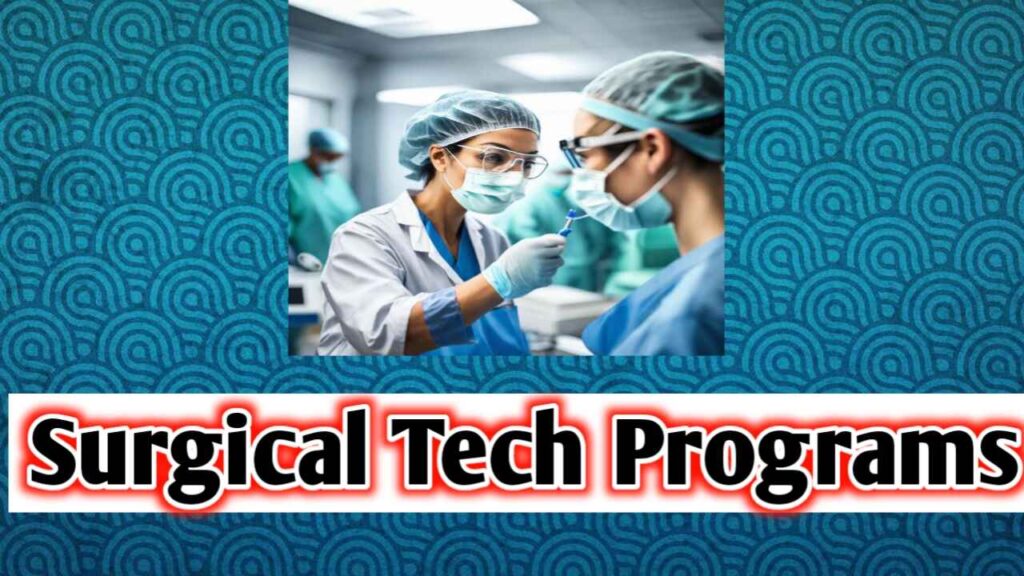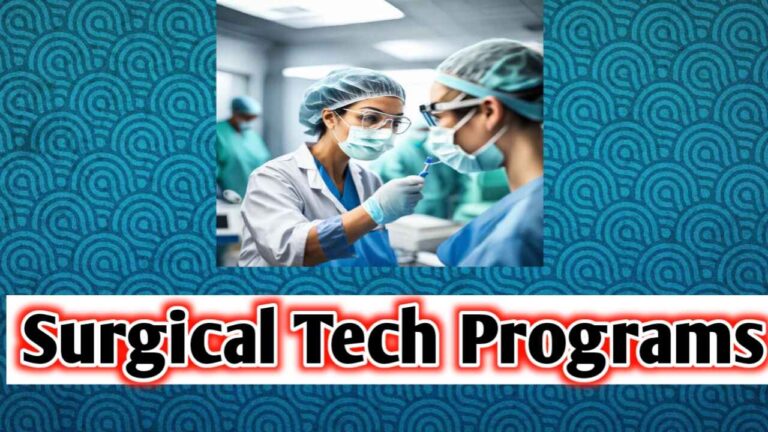Introduction

Surgical Tech Programs
Programs for surgical techs give graduates the know-how to support surgeons during surgeries, set up operating rooms, and organize equipment.
They are important for maintaining patient safety, lowering risks, and making sure surgeries go well.
The growing demand for skilled surgical technologists due to medical breakthroughs highlights the critical role these professionals play in the effectiveness and caliber of healthcare.
1. Choosing the Right Program
A number of variables need to be carefully considered while selecting a surgical tech program in order to make sure that it best suits your educational needs and professional goals.

- Reference: Check to see if the course is approved by reputable organizations such as the Accrediting Bureau of Health Education Schools (ABHES) or the Commission on Accreditation of Allied Health Education Programs (CAAHEP). Programs with accreditation follow industry norms, guaranteeing a high caliber of education.
- Course content and curriculum: Examine the course material. Seek out extensive programs that include anatomy, medical terminology, a variety of surgical techniques, and hands-on training. You can be ready for the wide range of needs in the industry with a well-rounded program.
- Options for Clinical Training: Think about the accessibility and caliber of clinical education. Practical experience in authentic healthcare environments is essential. Examine the connections.
For clinical rotations, the program has agreements with hospitals or other medical facilities. - Faculty Expertise: Examine the credentials and backgrounds of the faculty members. Expert teachers with real-world industry expertise can offer priceless advice and guidance.
- Adaptability and Format of the Program: Evaluate the program structure in light of your unique situation. Because online programs are flexible, students may manage their education and other responsibilities. Conversely, conventional on-campus programs might provide more opportunity for experiential learning.
- Resources and Technology: Examine the educational technologies utilized in online programs, such as virtual laboratories and simulation tools. Make sure these tools accurately replicate real-world situations to provide a thorough educational experience.
- Cost and Financial Aid: Assess the program’s total costs, taking into account tuition, fees, and other out-of-pocket expenses. Investigate any awards, scholarships, or financing alternatives.
Weighing the ease and learning styles of online and offline programs is necessary when comparing them.
With the flexibility of online programs, students can learn from anywhere at any time and at their own speed. Cornerstone Surgical Center
Even though they are less flexible, on-campus programs offer more practical experience and instant connection with peers and teachers.
In conclusion, your learning style, schedule, and professional objectives will determine which surgical tech school is the greatest fit for you.
Take into account these elements to help you make an educated choice that suits your requirements and puts you on the right track for a lucrative surgical technology career.
2. Building a Strong Foundation
Programs for surgical technicians provide a wide range of subjects and competencies necessary for success in the industry.

Medical vocabulary, anatomy, physiology, and sterile practices are commonly covered in foundational courses.
Surgical technicians must comprehend these topics because they comprise the fundamental information required for their work in the operating room.
Courses in anatomy and physiology explore the composition and operations of the human body.
It is essential to comprehend organs, tissues, and systems in order to predict surgical requirements, support surgeons efficiently, and guarantee patient safety.
Students who study medical terminology will be able to communicate clearly and accurately through the use of language that is common in healthcare settings.
The operating room requires strict adherence to sterile procedures. These courses instruct students on instrument handling, aseptic conditions maintenance, and operating room preparation to avoid infections and provide a secure surgical setting.
Here are some pointers for thriving in these foundational classes:
- Active Engagement: To grasp difficult concepts, actively participate in class, raise questions, and interact with the content.
- Effective Study Habits: Form constructive study habits by making study guides, reviewing notes and materials on a regular basis, and making use of a variety of learning tools.
- Practice with Hands-on Skills: Whenever you can, practice with hands-on skills. This could entail working with anatomical models, taking part in lab activities, or, if accessible, using simulation tools.
- Networking and Collaboration: Create study groups or participate in discussion boards to share information and resources. Working together with peers can strengthen learning and enhance comprehension.
- Looking for Advice: Seek guidance from mentors or professors on difficult subjects. Their wisdom and direction might provide insightful information.
6.Application of Knowledge: Integrate theoretical knowledge with real-world situations. Making connections between theory and practical applications improves understanding and recall.
- Time Management: Arrange your time wisely by planning your studies so that you have time for practice, review sessions, and coursework.
Succeeding in surgical tech programs requires mastering the core material.
Following these suggestions can improve knowledge comprehension, retention, and application, ultimately setting students up for success as competent surgical technologists.
3. Clinical Experience and Hands-On Training
Surgical tech programs place a great deal of emphasis on practical training since it connects classroom theory to practical practice.

These are essential experiences that provide students a chance to fully immerse themselves in real healthcare environments, getting practical exposure and honing their skills in the operation room.
Lessons and insights gained from the clinical experiences are priceless and cannot be duplicated in a classroom.
Working alongside seasoned professionals, students observe and take part in surgeries while developing their grasp of the subtleties of various procedures and learning to anticipate the demands of surgeons.
Utilizing clinical experiences to their fullest requires the following crucial tactics:
- Active Participation: Take part in clinical rotations in an active manner. Show passion and a want to learn by taking the initiative to help wherever you can.
- Reflection and Education: Observe the protocols with great attention. Take in the chronology, the functions of every team member, and the subtleties of various surgical procedures.
- Seeking Mentorship: Seek advice from seasoned surgical technologists or other medical specialists. Their mentorship might offer insightful commentary and helpful guidance to improve your learning.
- Posing Inquiries: Never be afraid to ask questions. Learning can be improved and comprehension can be deepened by asking questions regarding the methods, tools, and procedures utilized during surgery.
- Practical Application: When possible, practice under supervision with your skills. In this sector, practical experience is crucial since it helps one become proficient.
- Reflective Learning: Consider every clinical encounter. Make a note of what went well, what needs to be improved, and how to use the newfound knowledge in other situations.
- Adaptability and Professionalism: Show professionalism by following hospital procedures,keeping things private while adjusting to the hectic, dynamic atmosphere of the surgery room.
In addition to strengthening theoretical knowledge, these experiences foster the flexibility, critical thinking, and problem-solving abilities necessary for a prosperous surgical technology career.
By making the most of their practical experiences, students can become skilled and self-assured surgical technologists who are ready to make a big contribution to healthcare environments.
4. Networking and Professional Development
Developing strong relationships with peers, professors, and mentors in the surgical technology profession is essential to a successful career.

These relationships offer invaluable networking opportunities, support, and direction that are essential for both career and personal development.
Guide Ship: Developing a mentorship relationship with a seasoned professional can provide knowledge, counsel, and insights gleaned from years of real-world experience.
Mentors may help with skill development, career coaching, and offer priceless success advice.
Trainers: Building a relationship with surgical tech program professors might be advantageous.
They can provide guidance on careers, academic support, and occasionally even serve as a link to the business world.
Colleague Connections: Working along with colleagues is just as vital. Sharing information, expertise, and experiences with other students or professionals in the industry can establish a robust support network.
Peer networks have the power to promote cooperative learning, offer emotional support, and open doors to future professional or employment prospects.
Associations for Professionals: It is beneficial to join organizations and professional associations for surgical technology.
These organizations provide networking opportunities, industry updates, access to resources, and opportunity for continuing education.
Organizations that offer a forum for networking and keeping up with industry developments include the Association of Surgical Technologists (AST) and the National Board of Surgical Technology and Surgical Assisting (NBSTSA).
Trend Development: Getting involved with mentors, educators, and professional associations not only provides direction and encouragement but also opens doors to new prospects.
It can result in employment placements, career advancements, and a deeper comprehension of the field.
Building a network in the industry is essential for keeping up with developments, developing business connections, and even opening up new job opportunities.
5. Study Strategies for Success

Proficiency in time management and effective study strategies are essential for success in surgical tech programs, particularly when juggling education with personal or professional obligations.
A Methods of Study: Learning objectives can be maximized by using efficient study techniques.
Active reading, segmenting information into smaller, more digestible chunks, making study plans or review flashcards, and employing mnemonic devices are some of the techniques that help with remembering procedural knowledge and complex medical terminology.
Time Administration: Time management skills are essential. Prioritizing chores can be aided by making a thorough calendar that allots certain times for work, education, and personal obligations.
More productivity and attention can be achieved by setting reasonable goals for each study session.
Prioritization: Determine which tasks are most important and urgent, then order them accordingly.
Establish clear study objectives and arrange them in accordance with their degree of complexity or deadlines.
This tactic guarantees that important schoolwork gets enough attention.
Avoiding Postponement: Delaying things can be harmful. Divide work into smaller, more doable chunks to combat it.
Interspersing brief breaks with study sessions might enhance concentration and avert burnout.
Harmony and Adaptability: Maintaining a healthy balance between work, school, and personal life is crucial.
It is possible to make changes when unforeseen obligations come up using flexible time management. When it’s feasible, learning to say “no” or assigning tasks to others can help keep things in balance.
Make Use of Resources: Make use of the resources that are available. To improve learning and save time, make use of internet resources, instructional materials, or tutoring services.
Well-Being: Make time for yourself. To stay focused and productive, a good diet, enough sleep, frequent exercise, and relaxation are necessary.
Getting the hang of Time management and efficient study strategies not only maximize academic achievement but also make it possible to successfully balance a variety of obligations.
Students can successfully combine their academic endeavors with employment and personal obligations by putting these techniques into practice, which will promote a successful and well-rounded academic and personal journey.
6. Preparation for Certification and Job Placement
Aspiring professionals must comprehend the surgical technologists certification process.

To become certified, one must normally finish an approved surgical technology curriculum and pass an exam, such the CST (Certified Surgical Technologist) exam.
Success depends on being familiar with the exam topic, going over study resources, and taking practice exams.
Crafting a polished resume that highlights relevant experiences and skills, networking within the industry,
and preparing for interviews by researching potential employers, rehearsing frequently asked questions, and showcasing both technical expertise and soft skills like teamwork and adaptability are some strategies for a successful job search and interviews. Surgical Tech Programs
Furthermore, taking use of contacts made through professional associations or clinical experiences can frequently result in employment chances in the industry.
Conclusion
Your Roadmap to Success
The following seven stages are necessary to succeed in surgical tech programs: choosing an accredited school, accepting the curriculum,

making the most of clinical experiences, looking for mentorship, developing productive study habits, getting hands-on training, and participating in professional associations.
By taking these actions, people can successfully negotiate the potential and difficulties of a surgical tech program,
guaranteeing a comprehensive education and a strong basis for a satisfying career in the medical field.
Starting this journey promises not only a job but also a fulfilling career that will improve patient outcomes and the medical sector while having a significant impact on the healthcare industry.
FAQs
An educational path that equips people with the abilities and information required to support surgeons in the operating room is a surgical tech program. By setting up equipment, organizing operating rooms, and providing support to the surgical team, surgical technologists help during surgical procedures. Surgical tech programs typically lead to a diploma, certificate, or associate degree after 1-2 years of study. Indeed, there are possibilities for on-campus and online learning. On-campus programs give practical training, while online programs offer flexibility. The need for qualified surgical technicians is still growing, and graduates frequently find work in hospitals, surgery centers, or outpatient care settings.1. What is a program for surgical techs?
2. What are the duties of a surgical technologist?
3. How long does a surgical tech program take to finish?
4. Are surgical tech programs offered online?
5. How do I get a job after finishing a program for surgical techs?







1 thought on “Achieving Success in Surgical Tech Programs 7 Essential Steps to Master Your Future”